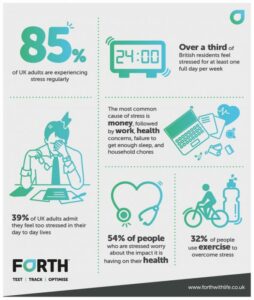Tag: Stress symptoms
Stress, everyone has it too some degree – some is healthy, lots is not.
What effect does a lot of stress have on your body?
Stress is known to affect the whole body but we shall focus on the way it affects the neck and shoulder girdle. Much research over the years has confirmed a connection between neck pain and stress. One study, for instance, in the BMC Musculoskeletal Disorders Journal, found that of nearly 500 people tested, those with stress, anxiety or depression had significantly worse neck pain that lasted longer than those without.
Even without the research though, lots of people will tell you that stress makes their neck and shoulders feel tight. When someone consciously relaxes, one of the most noticeable things to happen is their shoulders drop a couple of inches.
I’d go even further, and say that as the brain recognises the connection between stress and neck & shoulder tightness (and in fact initiates it). Let me explain, if someone has a tight neck or shoulders due to another cause, the brain, rightfully or wrongfully interprets this as the body being stressed.
If you have those muscles massaged and loosened and the neck releases, most people feel immediately less stressed.
Some of the many causes of neck or shoulder girdle dysfunction and stress crossover, such as long hours working at a computer to meet deadlines, and not sleeping very well. From this, secondary symptoms can develop, most commonly, headaches.
Some exercises that I recommend for tension headaches can be found here.
So what can we do about it?
Well, as always, firstly make sure there is nothing else causing your symptoms. Get a health professional to assess you and diagnose what is causing your symptoms.
If the diagnosis is stress or posture-related then get it treated. It’s important to treat from both a musculoskeletal point-of-view as well as understand and address the cause of your stress.
Alongside this, there are a number of at-home techniques you can do to help ease the tension in your neck and shoulders.
1. Do neck and shoulder mobility exercises.
A couple of quick and easy exercises I would recommend would be:
Exercise 1 :
https://www.youtube.com/shorts/vSBsfMnMx6M
Exercise 2 :
https://www.youtube.com/shorts/X6XJdciru0Q
Exercise 3 :
https://www.youtube.com/watch?v=A0HWan_RPwo
2. Get a good amount of quality sleep.
Stress is known to affect your ability to sleep. There are things you can do to give yourself the best chance of sleep.
– Make sure you’re comfortable in bed
– Be strict with no blue light (screens) for at least an hour before bed
– Having a warm bath or shower to help you relax
3. Find something to relax you.
It doesn’t have to be meditation or yoga, it could be exercise or playing an instrument. Perhaps avoiding instruments such as the violin which will exacerbate neck & shoulder pain. The ides if to find something that sends you to your flow state. Something that will distract you that you really enjoy and will relax you.
4. Work in a good environment.
Set up your workstation in an ergonomic way will do wonders for your posture. Remember to have lots of breaks and consider investing in a standing desk. If you’re interested in knowing what an ergonomic workstation set up looks like, continue reading here.
5. Speak to a healthcare professional.
Your health professional may recommend you get support or therapy for your stress, anxiety or depression, or any mental health issues you may be experiencing.
_____________________
Is Osteopathy the right path for you?
Osteopathy is a holistic way to diagnose and alleviate stress-related musculoskeletal problems including shoulder and neck pain and secondary symptoms such as headaches. The treatment is catered to the individual and Andrew will take all aspects of a patient’s lifestyle into consideration when suggesting a treatment plan.
All treatment starts with an initial consultation followed by any recommended follow up treatment. You can book your initial consultation with Andrew Doody online.
Stress: Are we coping?
We all feel the effects of stress in daily life, whether it’s managing children or dealing with a problem at work. Stress is a normal response, in fact, in small doses, stress can be useful. The problems arise when you start to have a ‘fight or flight’ stress response to situations in everyday life. This can lead to illness, both mentally and physically.
The first step is to recognise symptoms of stress:
- Nail biting and fidgeting
- Over-eating or loss of appetite
- Irritability with other people
- Substance abuse, including alcohol and smoking
- Lack of concentration
- Increased and suppressed anger
- Feeling out of control
- Excessive emotion & crying
- Lack of interest in anything
- Permanently tired even after sleep
By identifying stress-related problems as early as possible, action can be taken to avoid any serious stress-related illness. For Mental Health Awareness week, which runs from 14-18 May, here are some tips to help manage your own personal stress:
- Be active – 30 minutes a day can reduce the emotions and let you take the time to think more clearly
- Take control – you are your own worst enemy, but you are also the key to empowerment!
- Find support – Connect with your family and friends, the more help the better the solutions
- Take time for yourself – remember to have time for yourself as well. Read, relax and get things done on your to do list that may be holding you back
- Create challenges for yourself – Setting achievable goals, little or big can help build confidence in your abilities
- Avoid unhealthy habits – Cut down on caffeine, smoking, and alcohol. These can enhance the feeling of stress in the long run
- Be positive – Instead of looking at problems negatively, try to see what you can get out of it to help you grow. Be grateful!
- Acceptance – Take ownership of mistakes, or acceptance of things you can’t control.
Our Occupational Health team at the Fleet Street Clinic are able to provide a full range of work health assessments to address the occupational health needs of your staff. Click here for more information.
To book an appointment with one of our friendly doctors, or for further details on what we can offer for our Occupational Health, call us today on 0207 353 5678 email info@fleetstreetclinic.com or book online now.





